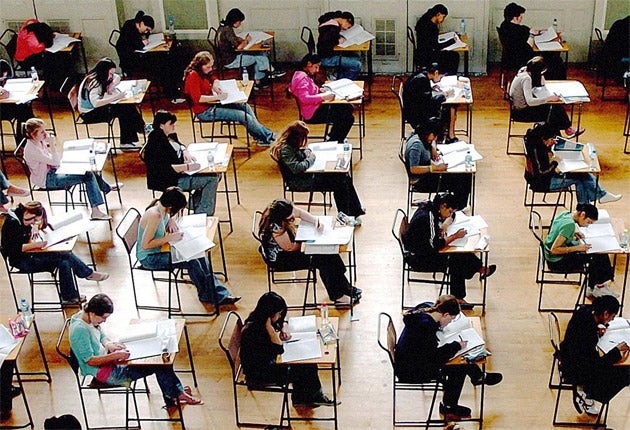Scandal of class divide at A-level
State schools in poor areas spurn traditional subjects to boost results

Scores of state schools have become "no-go" areas for pupils taking traditional A-level subjects such as maths, science, history, geography or languages, research reveals today.
One in seven schools failed to enter a single candidate for A-level physics or geography this summer, while one in 13 failed to enter candidates for history and one in 17 for maths. Last night, academics warned of a major class divide in the take-up of A-level subjects as 250,000 students await their results tomorrow.
Professor Alan Smithers, of the Centre for Education and Employment Research at Buckingham University, said the damaging impact of league tables was partly to blame. "This is the awful thing about league tables," he added. "They disrupt the behaviour of schools because they make them responsible for getting the highest scores." Schools in deprived areas were also more likely to have difficulty in recruiting high-quality maths, science and language teachers, he added.
The analysis of A-level results, carried out for the Conserative Party, showed most of the schools where no one studied history were in the poorest areas of the country, and had twice the national average number of pupils receiving free school meals.
At the same time a study by Cambridge Assessment, which runs three exam boards including Oxford, Cambridge and RSA Examinations (OCR), showed that children from the higher social classes were more likely to opt for subjects such as biology, further maths, English literature and languages, while those from lower-class backgrounds opted for subjects such as ICT, media studies, law and health and social care.
John Dunford, general-secretary of the Association of School and College Leaders, said this was likely to be because schools in poor areas thought their weaker candidates were more likely to pass A-levels in these subjects.
The Cambridge study also revealed that almost half of the comprehensive school pupils studying A-level French dropped out at the end of the first year, fuelling concern that languages are harder to pass than most other subjects and are becoming a preserve of independent and selective grammar schools. In total, 39 per cent dropped French while the figure for Spanish was 36 per cent.
"Students attending grammar and independent schools were generally at least twice as likely to have chosen a modern foreign language as one of their AS or A-level subjects than students attending any other type of school," said the report.
While 5.4 per cent of the 4,000 pupils surveyed studied AS-level French, which is usually taken at the end of the first year of a two-year A-level course, only 2.9 per cent went on to complete the full A-level course.
The number of dropouts at independent and grammar schools was also significant. Again, in French, the percentage taking the subject fell from 14.6 per cent to 10.5 per cent and in independent schools from 12.5 per cent to 7.9 per cent.
The Conservatives are proposing to give more weight in the exam league tables to "hard" A-level subjects, such as maths and science. Nick Gibb, the party's schools spokesman, said: "The disappearance of core academic subjects in many state schools is extremely worrying. We need to reverse this trend and ensure more children at least have the opportunity to take these subjects at A-level. That is why we are going to change league tables so they give more weight to the most valued subjects, more closely reflect the priorities of universities and employers and therefore prepare young people better for the future."
However, the Schools Minister, Iain Wright, argued that it was "too simplistic" and "ridiculous" to suggest that every school or college should teach every A-level subject.
"What is important to look at is whether young people are taking these A-levels and the evidence from last summer shows that traditional subjects are doing well," he added. "The top five subjects that saw the biggest increase in entries included maths, English, history and biology. Between them these four subjects saw increases of more than 11,000 entries: more than half of the overall increase in A-level entries seen last year."
* About 60 independent schools intend to boycott their own sector's A-level and GCSE results tables. They include Perse Girls' School in Cambridge, which came second in the table last year. Its headteacher, Tricia Kelleher, described the rankings as a "beauty parade" which did not do justice to the range of qualifications on offer at the school.
Join our commenting forum
Join thought-provoking conversations, follow other Independent readers and see their replies
Comments